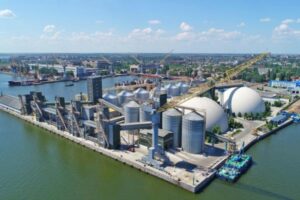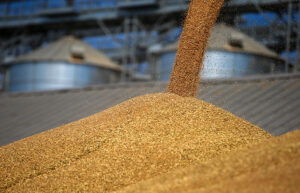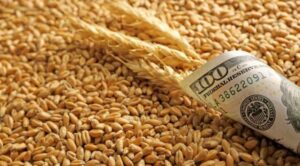
Export revenues of the Ukrainian IT sector last year amounted to $6.45 billion, which is 4.2% less than in 2023 and 12.3% less than in 2022, according to statistics from the National Bank of Ukraine (NBU).
The largest inflows in terms of this year were recorded in the fourth quarter – $1.67 billion, while for the same period in 2023 and 2022, this figure was $1.70 billion and $1.87 billion, respectively.
According to statistics, the United States of America was the most active importer of Ukrainian IT last year, with $2.39 billion worth of goods, although its share in the total volume decreased by 2.6 percentage points (p.p.) to 37.2%.
The second place was taken by the UK, which increased its share by 0.8 p.p. to 8.8% and imported $565 million worth of Ukrainian IT services.
It was followed by Malta, whose share among importers decreased by almost 0.7 percentage points to 7.8%: in 2024, the country purchased $565 million worth of IT services from Ukraine.
The top five countries in terms of consumption of Ukrainian IT exports are Cyprus and Israel, whose shares slightly increased in 2024 to 6.1% and 4.6%, respectively. Cyprus imported $394 million worth of Ukrainian IT, while Israel imported $297 million.

“Nibulon is now one of the three largest grain exporters in Ukraine and has been profitable for two and a half years, with EBITDA of approximately $68 million in 2024, Andriy Vadatursky, owner of one of the largest grain market operators in Ukraine, JV Nibulon LLC, told NV in an interview.
He noted that this figure is slightly lower than the agricultural holding planned due to difficulties in the second half of the year, and added that in a few days he will have the exact figure of financial performance for 2024.
Commenting on the information about the increase in the share of Nibulon’s own fleet in 2024 from 26% to 55%, and the volume of transportation from 278 thousand tons to 404 thousand tons, Vadatursky reminded that the company was built on investments in alternative ways of delivering products, in particular, in water transport. Accordingly, elevators were built on the Dnipro River and the Southern Bug River.
“Now all this is standing still. Kherson is under fire, Mykolaiv is closed. The fleet has nowhere to work. More than 100 ships are blocked. Some elevators, even in the occupied territory, are left without water. The
Kakhovka dam was broken in May 2023. The prospect of returning was taken away from us. I can’t imagine that the river (transportation by the Dnipro) will work for 5-10 years, even after the victory,” he said.
To solve this problem, Nibulon leased vehicles from Scania (Sweden), increased the number of vehicles and, of course, optimized its operations to use its own vehicles as much as possible.
“We have 138 new vehicles in total. We have purchased about 70 vehicles, I think, for EUR 17 million. Denmark also helped us. They take care of Mykolaiv region. For example, we got a loan from EIFO. Denmark gave us a 14-year loan for agriculture. (…) We received about EUR12.5 million. We purchased German machinery,” said the owner of the agricultural holding.
Mr. Vadatursky added that foreign investors are extremely cautious about investing in Ukraine, while bureaucratic Europe is very slow to change course and spends a lot of time on simple things.
JV Nibulon LLC was established in 1991. Prior to the Russian military invasion, the grain trader had 27 transshipment terminals and crop reception complexes, a one-time storage capacity of 2.25 million tons of agricultural products, a fleet of 83 vessels (including 23 tugs), and owned the Mykolaiv Shipyard.
“Before the war, Nibulon cultivated 82 thousand hectares of land in 12 regions of Ukraine and exported agricultural products to more than 70 countries. In 2021, the grain trader exported the highest ever volume of 5.64 million tons of agricultural products, reaching record volumes of supplies to foreign markets in August – 0.7 million tons, in the fourth quarter – 1.88 million tons, and in the second half of the year – 3.71 million tons.
Nibulon’s losses due to Russia’s full-scale military invasion in 2022 exceeded $416 million.
Currently, the grain trader is operating at 32% of capacity, has created a special unit to clear agricultural land of mines, and was forced to move its headquarters from Mykolaiv to Kyiv.

As of January 29, Ukraine exported 25.353 mln tonnes of grains and pulses since the beginning of 2024/25 marketing year (July 2024 – June 2025), of which 3.121 mln tonnes were shipped this month, the press service of the Ministry of Agrarian Policy reported citing the data of the State Customs Service.
It is noted that as of January 30 last year, the total shipments amounted to 23.146 million tons, including 4.582 million tons in January.
In the current season, Ukraine has already exported 10.7 mln tonnes of wheat (9.027 mln tonnes in 2023/24 MY), 2.064 mln tonnes of barley (1.4 mln tonnes), 10.8 thsd tonnes of rye (1 thsd tonnes), and 12.166 mln tonnes of corn (12.465 mln tonnes).
As of January 29, the total exports of Ukrainian flour in the current season are estimated at 43.3 thsd tonnes (52 thsd tonnes in 2023/24 MY), including 39.9 thsd tonnes of wheat (48.6 thsd tonnes).

ArcelorMittal Kryvyi Rih’s Kryvyi Rih Mining and Metallurgical Plant (AMKR, Dnipro region) has mastered the production of a new type of billets with a size of 160×160 mm in the continuous casting department of its converter shop to increase exports.
As reported in the corporate newspaper Metallurg, until recently, the department’s product mix was limited to 130×130 and 150×150 mm square billets. The new product was launched due to its economic advantages and export potential, as the 160×160 mm size is used by rolling mills in many countries.
The project was successfully implemented thanks to careful calculations, equipment modernization and well-coordinated teamwork. These products will enable the production of heavier rebar coils, which will reduce transportation costs and increase the company’s competitiveness.
The company explains that VBRS products are steel billets used in rolling mills to make rebar, wire rod, angles and other rolled products. And the billets themselves are in demand on the market.
“Rebar in coils is currently in demand on global markets. Our DS 250-4 mill produces bobbins in coils up to 2 tons. And 30 such coils can be placed in a railroad car, i.e. 60 tons. If we increase the weight of the coils, we can transport up to 67 tons of products in a railroad car. This means that we can save a lot of money on transportation, which is especially important given that transportation prices are rising. That’s why we needed more massive billets to produce heavier coils,” said Igor Smolev, Deputy Director of the Rolling Department for Technology and Quality.
In turn, Dmitry Terekhov, Director of the Iron and Steel Production Department, said that the second good reason to start manufacturing new products was that many rolling mills in the world, in particular in Germany and Poland, use 160×160 mm billets, so this is a very promising product right now.
“Together with the technical department, we explored the possibilities of producing the billets in demand and found that it was possible, despite the fact that our continuous casting machines (CCMs) were not designed for this. We decided to use CCM-1 because it produced only 150 mm squares, while the first and second machines produce both 150 mm and 130 mm. The first machine is also used for closed jet casting, so it is on this machine that we produce the vast majority of billets from high value-added steel grades (high-alloy, low-carbon, etc.),” Terekhov stated.
“ArcelorMittal Kryvyi Rih is the largest producer of rolled steel in Ukraine. It specializes in long products, including rebar and wire rod. The company has a full production cycle and its production capacities are designed to produce over 6 million tons of steel, over 5 million tons of rolled products and over 5.5 million tons of pig iron annually.
ArcelorMittal owns the largest mining and metallurgical plant in Ukraine, ArcelorMittal Kryvyi Rih, and a number of small companies, including ArcelorMittal Berislav.

Since the beginning of 2024-2025 marketing year (July-June) and as of January 24, Ukraine exported 24.475 mln tonnes of grains and pulses, of which 2.514 mln tonnes were shipped this month, the press service of the Ministry of Agrarian Policy and Food reported, citing the data of the State Customs Service of Ukraine.
According to the report, as of the same date last year, the total shipments amounted to 22.246 mln tons, including 3.682 mln tons in January.
In terms of crops, since the beginning of the current season, the country has exported 10.563 mln tonnes of wheat (650 thsd tonnes in January), 2.035 mln tonnes of barley (36 thsd tonnes), 10.8 thsd tonnes of rye (0), and 11.729 mln tonnes of corn (1.82 mln tonnes).
Thus, the volume of wheat exports for 2024/2025 MY agreed by the Ministry of Agrarian Policy and grain market participants at 16.2 mln tonnes has already been exhausted by 65%.
The total exports of Ukrainian flour since the beginning of the season as of January 24 are estimated at 41.6 thsd tonnes (4 thsd tonnes in January), including 38.2 thsd tonnes of wheat (3.7 thsd tonnes).